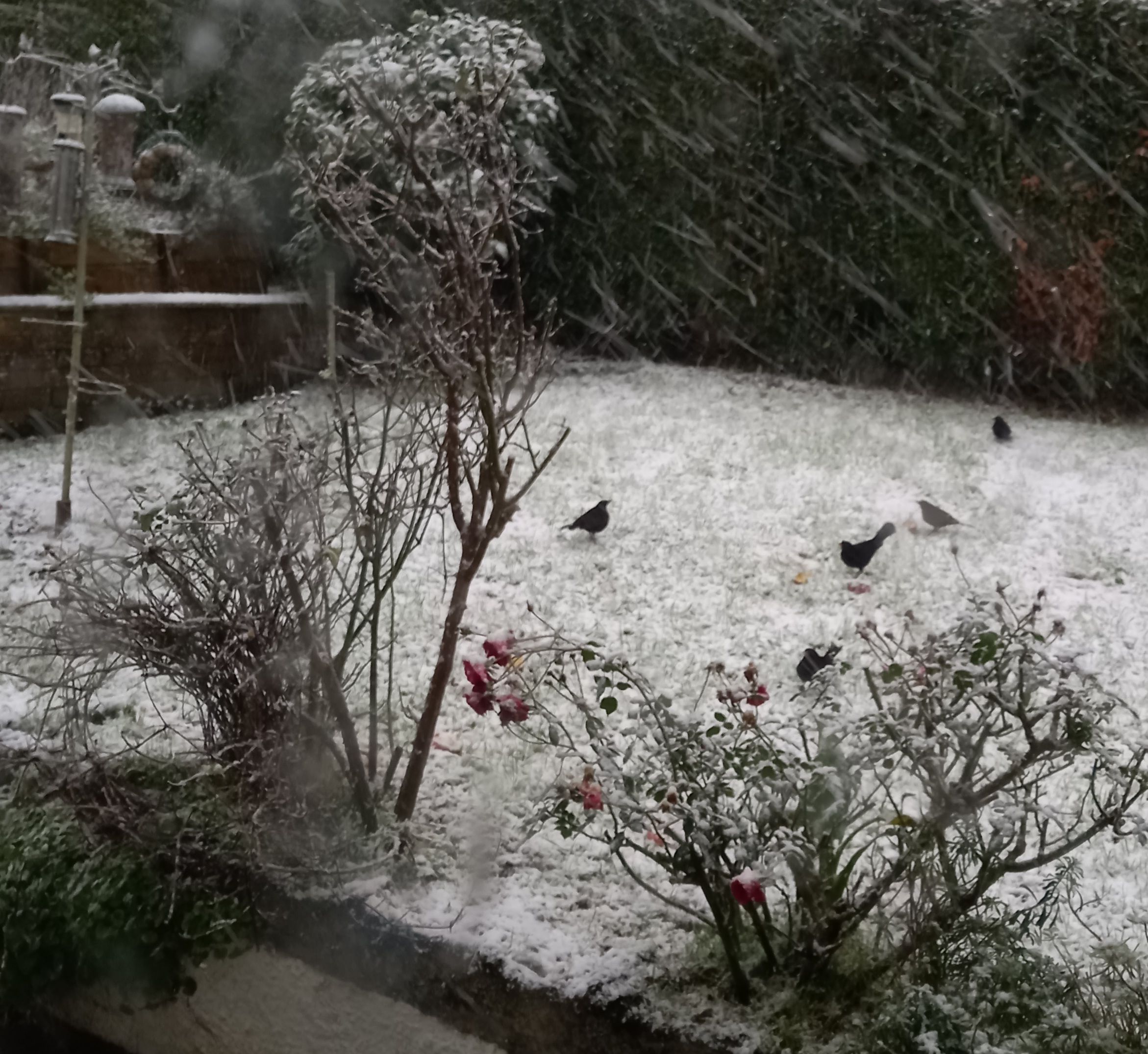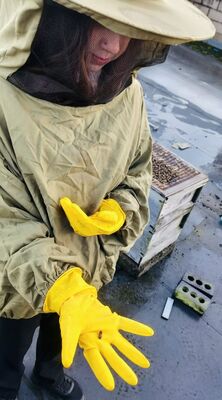YOU’VE heard of spot the ball – well here’s spot the blackbird.
Dúlra caught six of them on camera in his garden this week as the first snow of winter fell. (Can you see them? There are five on the lawn and one that’s hard to make out on the feeder on the left.)
It was a pure pleasure to be able to help them through at least one treacherous day of winter. These birds had come from abroad – that was clear by their behaviour. Most likely Scandinavia. They were jumpy and on edge, unlike our native blackbirds which happily share gardens with us in summer and merrily sing from the treetops at dusk. The birds in Dúlra’s garden this week had travelled across the Irish Sea in a desperate race with death.
There is danger everywhere for them and it’s a safe bet they’ve seen large numbers of their fellow travellers perish along the way. Hunger and cold will take most, then hawks and other predators will pick off the weak. The flock in Dúlra’s garden will stay while there is food, but if it runs short even for a few moments, they won’t take a chance on waiting for another handout. They’ll be up over the hedges as if their lives depended on it. Which they do. In no time they’ll be into Counties Down and Armagh and then even further south.
Just a few years ago, blackbirds like these would have arrived in Ireland to find an abundance of food. Our hedgerows offered up haws by the trillions. Ireland has always been synonymous with its hedgerows, and hawthorns are the hedgerow staple. Hawthorns are often undervalued by us because they refuse to conform to our tree-growing convention – that it should have a single trunk stretching into the sky. Hawthorns are more like bushes, growing out and up.
Occasionally Dúlra comes across a single hawthorn which has happened to seed well away from its relatives, and only then can its true beauty be appreciated. It sprawls lazily in light layers, each branch trying to escape the thick, dark centre. Its beautiful mayflower soon turns to ruby-red berries that are gobbled up by thrushes in winter, who then do the tree a favour by passing the seeds far away from the parent tree.
But few Irish farms today allow their hawthorn hedges to grow. Every spring and autumn, tractor-mounted cutters trim them into box-hedges. Suddenly, those trillions of berries have become a trickle.
Blackbirds will eat bread, but it doesn’t last long. What brings them to Dúlra’s garden is an apple a day. And unlike bread, they can’t pick the apple up and fly away with it to eat. The apples, which Dúlra cuts in half, sit in the garden all day while the blackbirds eat the flesh, finally leaving the thin skin hallowed out like a little bowl.
Apples don’t come cheap – four for a pound is the cheapest he’s found. They inevitably come wrapped in plastic, a practice banned in France from the start of the year. There, no fruit or vegetables can be wrapped in plastic in a policy aimed at stopping single-use plastic. It’s a great idea which should be implemented here.
When the snow fell on Tuesday, Dúlra offered them two apples, which kept the blackbirds busy for hours. Otherwise, in a country bereft of haw berries, they could well be doomed. An apple a day doesn’t just keep the doctor away, it keeps the blackbirds at play.
• It may be bitter cold and due to get even colder as we head into the depths of winter, but for some creatures, a little chill won’t put them off the vital business of, well... doing the business. This year, Dúlra has the perfect home for the frogs which will emerge from under plants and rocks and snow in a matter of weeks to breed.
He sank the old Belfast sink into the earth in the front garden and filled it with water. Two years ago he released scores of frogs which he grew from spawn into the garden. One night next month, the stars will align and they’ll get the primordial urge to find a mate. Even sub-zero temperatures won’t dissuade them. They have to find water – which at this time of year is often frozen over – for the spawn. With so much damp land having been dried out, Dúlra’s hoping his ceramic sink will be a godsend. He’s even decorated it with a few logs, just to help them get into the spirit.
How could they resist such an attractive proposition?
• If you’ve seen or photographed anything interesting, or have any nature questions, you can text Dúlra on 07801 414804.







